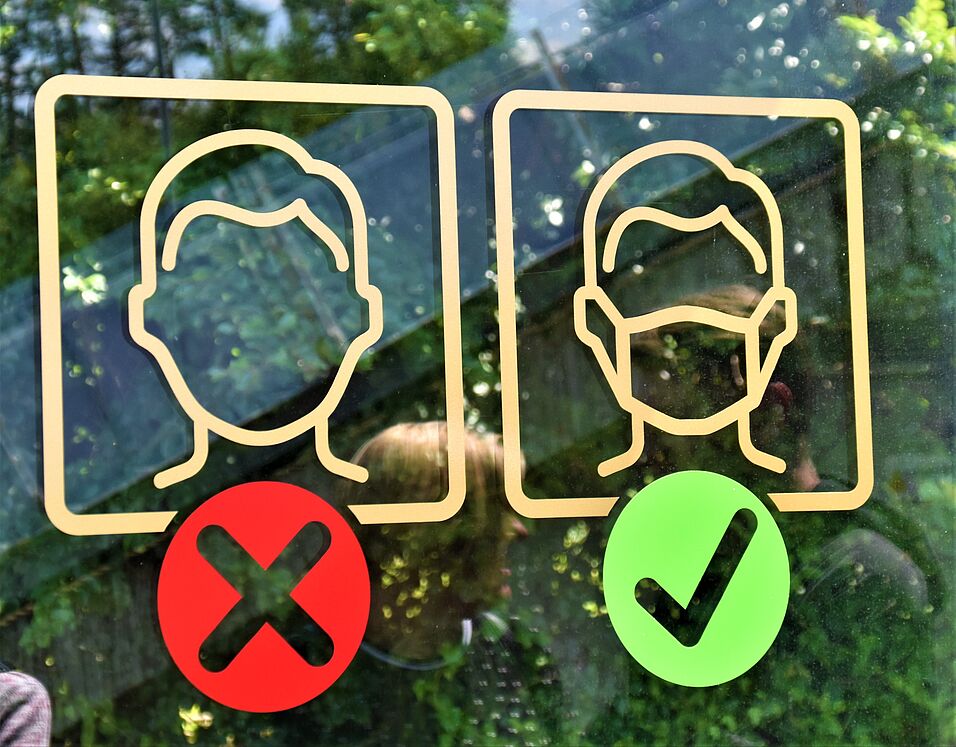Against this background, this study aims to elicit the values and attitudes of individuals underlying the wearing of face masks. To this end, interviews were conducted with people living in German-speaking Switzerland in April 2020 (n=31) and October 2020 (n=25). We analyzed these interviews using qualitative research methods. The interviews were collected as part of the research commons "Solidarity in Times of Pandemic" (SolPan).
From the participants' statements, we were able to identify five themes. The first theme, trust and governmental policy, illustrates a loss of trust in the government by many participants concerning face masks. Reasons cited included inconsistent statements by the authorities about the usefulness of masks at the beginning of the pandemic but also regional differences in mask regulations until fall 2020. Some participants remained sustainably uncertain whether and to what extent the mask-wearing would be useful for pandemic containment.
In contrast, many participants spoke about the perceived benefits of wearing face masks. They perceived it as a moral duty to protect themselves and others by wearing a mask even without official regulation. Some also felt safer wearing a mask. Others saw it as an opportunity to move more freely and go to the theatre, for example. Some participants also described face masks as a visible sign that the pandemic was not over.
Perceived risks of wearing masks were also an issue. Some were concerned that masks would become "normal" "like in Asia." This idea was "terrifying" to several participants. Loss of facial expressions and improper use of masks were also mentioned as disadvantages.
Some participants told of social exclusion and prejudice with respect to face masks. In April 2020, some participants made fun of people or reacted with alienation when they saw them wearing masks in the forest or in a car, for example. The lack of general mandates to wear face masks led many participants to feel uncomfortable when they voluntarily wore a mask and thus belonged to a minority. They felt like they were considered sick and contagious if they wore a mask without it being mandatory. On the other hand, many participants considered it antisocial to observe people who did not comply with applicable mandatory mask regulations, especially in October 2020.
The absence of general, national mask mandates meant that the decision of when to wear a face mask was assessed on an individual basis. Some participants strictly adhered to the regulations and only wore a face mask when they had to. Others reported "instincts" and "momentary decisions" when to wear a mask, for instance in crowded places. In light of rising case rates in October 2020, many participants mentioned that they would probably wear a mask more often now. The benefits of masks in this context were rated higher than the risks: Many participants were willing to accept general mask mandates in this context, despite earlier reservations.
Consequently, while the absence of general face mask mandates underscores people's individual autonomy, personal responsibility might be suppressed, for example, if people feel excluded because only a minority wears a mask in certain contexts. A mask requirement thus supports those who feel overwhelmed to make constant assessments of when to wear a face mask. It also supports people who would otherwise feel socially isolated should the majority not wear a mask. Nevertheless, the need for autonomy and personal responsibility was high among the German-speaking Swiss participants. Therefore, mask mandates were considered acceptable only temporarily. Accordingly, it was concluded from the analysis that it is important to repeatedly carry out new cost-benefit considerations and to introduce general mask mandates when the current pandemic situation demands it.
This article is a summary of a scientific publication: Zimmermann, B.M., Eichinger, J., Schönweitz, F., Buyx, A. Face mask uptake in the absence of mandates during the COVID-19 pandemic: a qualitative interview study with Swiss residents. BMC Public Health 21, 2171 (2021). https://doi.org/10.1186/s12889-021-12215-4

